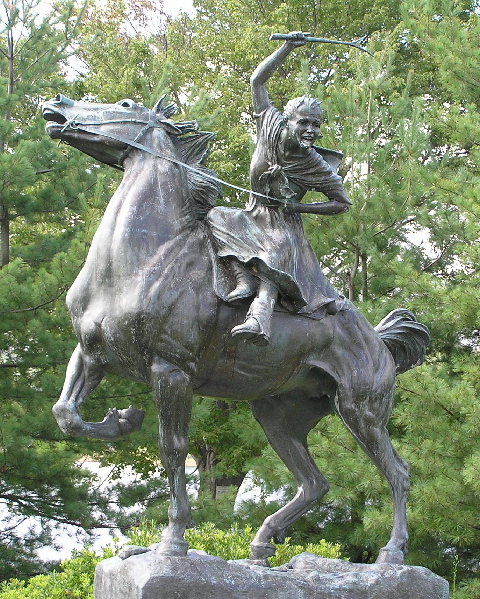no, an otpy
He’s got a fully revised and updated “A Short History of Nearly Everything 2.0” coming out in October.
Presumably the same as this with “ville” appended.
Huh, I thought he said he was retiring from writing, and would publish no more books. Maybe a revision doesn’t count.
Makes me sad, several of his books are really great and had me laughing.
Thank you for this info.
Speaking of debunked historical myth…
There is no record from Sybil Ludington’s lifetime of her making her ride. She never mentioned it in anything she wrote (at least not in any surviving written records).
The first time her supposed ride was recorded was in 1854, seventy-seven years after it supposedly occurred (and sixteen years after Ludington died). The first recorded account was from her nephew, Charles Ludington.
Yep. I agree, having read the Wikipedia article. No such ride.
I’d like to believe in the story of Sybil Ludington. I used to live in Carmel, NY and we had a statue of her in the town square.
What about Charles Fort?
I think it’s likely that this did not happen as described. Probably, reading the 1880 book that seems to have had a large hand in the story, it was family lore with some grain of truth that took on a life of its own. At the same time, I find it interesting that the author(s?) of her Wikipedia article really, really want you to know how sparse the evidence is (indeed, there has been some back-and-forth in the page history about its dubious neutrality).
Conversely, we are told in the lede of his own article that Paul Revere “played a major role during the opening months of the American Revolutionary War in Massachusetts,” with the only additional context being a single sentence well down the page hinting:
The ride has been commemorated in a range of cultural depictions, most notably Henry Wadsworth Longfellow’s 1861 poem, “Paul Revere’s Ride”, which has shaped popular memory of the event, despite its factual inaccuracies.
(Don’t worry, the article on the midnight ride itself assures us that “the inaccuracies were deliberate”)
It’s an impressive work in bronze by Anna Hyatt Huntington. But the uneven oxidation on Sybil’s face now makes her look scary.
With the huge popularity of “Hamilton,” this would be much less unknown than it may have been 10+ years ago.
Dante didn’t call his magnum opus the “Divine Comedy” - the original title was just the “Comedy” (or Commedia). It was Boccaccio who added “Divine” (or Divina) in his biography of Dante, and the scholarly consensus is that he was expressing his praise and/or describing its subject matter and style, not giving it a new title.
And the educated classes knew the approximate circumference of the Earth. Columbus thought its circumference was much smaller. So, not only was he not right wherein everyone else was wrong, he was wrong wherein (mostly) everyone else was right. If the Americas had not been there, he and his crew would have died trying to get to Asia.
I suppose most of the learned members here are already aware of this, but just in case….
Julius Casear’s last words were not “Et tu Brute” That was a Shakespearean invention. According to the ancient sources, he either said nothing at all or “You too child” in Greek, directed to Brutus.
Personally, if I had just been stabbed 20 times, talking might not be high on my list of priorities.
Teddy Roosevelt, leading his Rough Riders, didn’t charge up San Juan Hill.
He charged up Kettle Hill.
So the world was actually more flat than Columbus believed?
No, the world was more fat than Columbus believed ![]()
